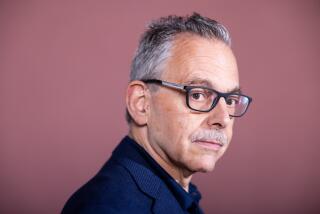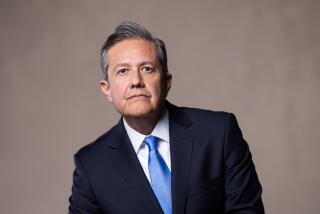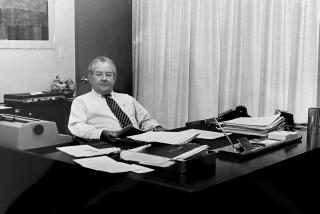Jorge Mas Canosa; Fought to Free Cuba
- Share via
MIAMI — Jorge Mas Canosa, a wealthy Cuban American businessman who rose from exile to wield enormous influence in shaping this nation’s hard-line policy toward Cuba, died Sunday of lung cancer. He was 58.
Mas Canosa fled Cuba less than two years after Fidel Castro came to power in 1959. From his home in Miami, he became the Cuban president’s most prominent and feisty foe.
As head of the Cuban American National Foundation, Mas Canosa lobbied for the creation in 1985 of Radio and TV Marti, a $25-million-a-year operation that aims pro-democracy broadcasts at the island. He was considered the chief architect of the 1996 Helms-Burton Act, which tightened the 36-year U.S. trade embargo against Cuba.
The death of Mas Canosa provoked an outpouring of grief in Miami, where he was seen by many as a likely successor to Castro in a democratic Cuba. He often denied that he harbored those ambitions, insisting instead that he just wanted to see Cuba free of Castro and communism.
“Unfortunately, he will never set foot in a free Cuba,” said Jorge Mas Jr., in announcing his father’s death at an afternoon press conference. “But his spirit and the legacy that he has left us will.”
Tributes poured in from political leaders, including President Clinton. Speaking from Vancouver, where he is attending a summit of Asia-Pacific leaders, Clinton called Mas Canosa a “born leader and organizer whose tenacity, strength of conviction and passion I greatly admired.
“We have lost a forceful voice for freedom in Cuba and elsewhere, but his dream lives on. He will be missed.”
Three Cuban American members of Congress--Miami Republicans Ileana Ros-Lehtinen and Lincoln Diaz-Balart, and New Jersey Democrat Robert Menendez--issued a joint statement saying that Mas “would not wish that the pain of his passing cause pessimism among Cuba’s freedom fighters. Our best homage to his memory is to continue to fight until Cuba is free.”
Mas Canosa built his personal fortune first with a Miami construction company and then a telecommunications firm, MasTec, which is now a publicly traded corporation valued at $475 million. Mas Canosa and his son, who heads MasTec, are listed among the 10 richest Latinos in the United States.
But Mas Canosa’s clout in Washington grew out of his passion for Cuba and the foundation money he poured into the campaign coffers of those who supported his anti-Castro cause. His influence in the capital skyrocketed during the Reagan administration, when he helped deliver Cuban American votes to GOP candidates.
“His death leaves a terrible void in the leadership,” Miami Mayor Xavier Suarez said.
Personally, Mas Canosa could be irascible and combative, especially when he felt he was being unfairly criticized. He once challenged a Miami politician to a duel.
In recent years, Mas Canosa feuded often and angrily with the Miami Herald, for example, urging Cuban Americans to boycott the newspaper and paying for signs on buses proclaiming, in Spanish, “I don’t believe the Herald.” He considered the paper too liberal in its coverage of Cuba.
He lashed out at CBS’ “60 Minutes” after a profile he considered biased, and he sued the New Republic magazine for libel when a headline on a 1994 article described him as a “mobster.” He settled the case out of court when the magazine issued a clarification stating that the word “was used in a metaphorical rather than a literal sense.”
For more than three years, the U.S. Information Agency and the State Department investigated charges that Mas Canosa exerted undue influence over the operation and content of Radio and TV Marti as chairman of the Office of Cuba Broadcasting advisory group. The probe was inconclusive.
Mas Canosa was a native of Oriente, in eastern Cuba, and immigrated to the United States in 1960. His first job in Miami was delivering milk. He took part in the abortive Bay of Pigs invasion in 1961 but never landed on the island.
Mas Canosa was widely known in Cuba, where government officials described him as “Godfather of the Miami Mafia.” In an obituary, the official Cuban news agency, Prensa Latina, called him “a promoter and partisan of all actions against the revolutionary government of Cuba.”
Sen. Robert Torricelli (D-N.J.), chief author of the Cuban Democracy Act of 1992, which tightened the Cuba embargo, predicted that even without its chairman and founder, the Cuban American foundation would live on as a powerful anti-Castro lobby. “If Fidel takes some comfort in [Mas’] death, he’s too late,” Torricelli said. “What Jorge Mas Canosa put in motion is irreversible.”
More to Read
Sign up for Essential California
The most important California stories and recommendations in your inbox every morning.
You may occasionally receive promotional content from the Los Angeles Times.










